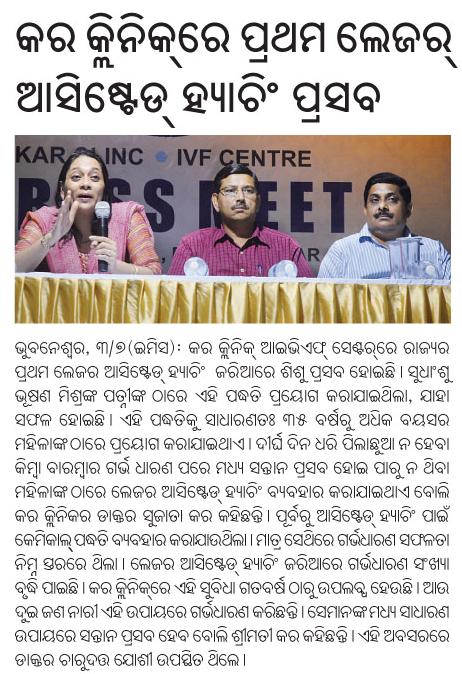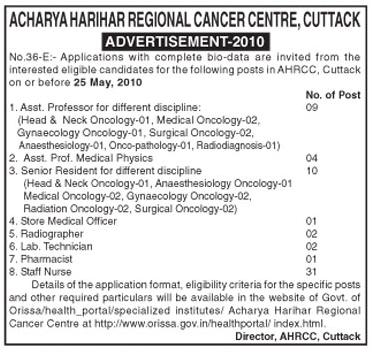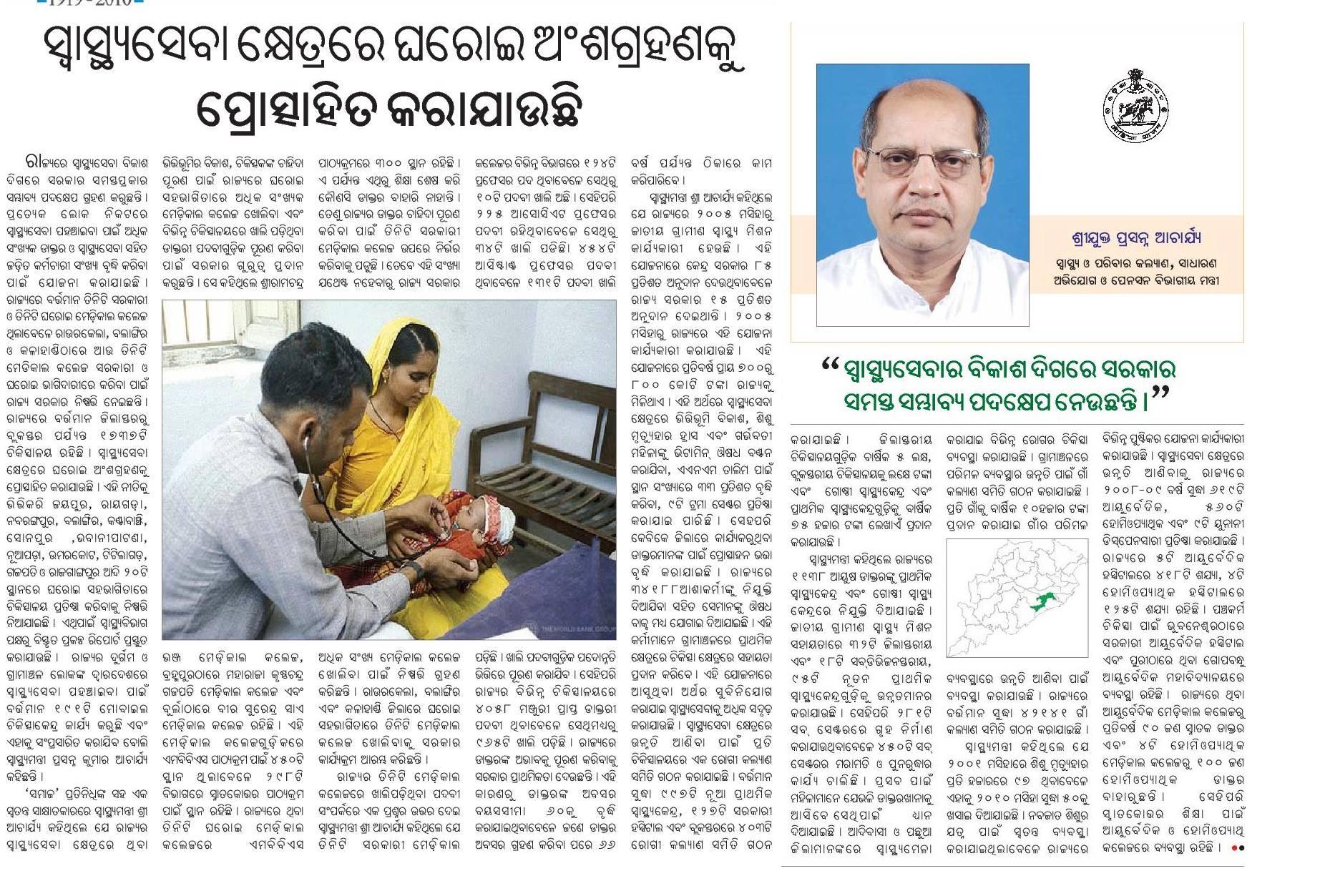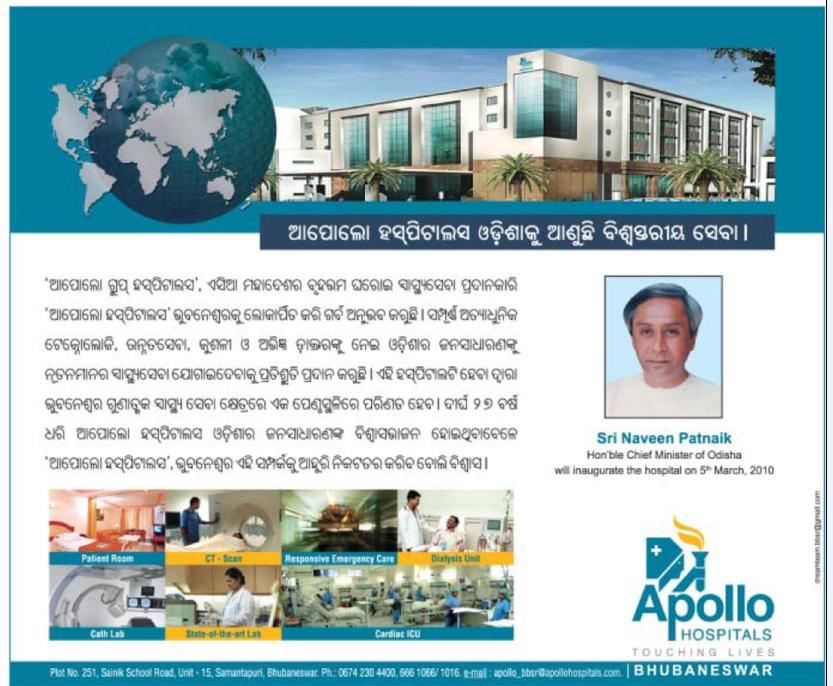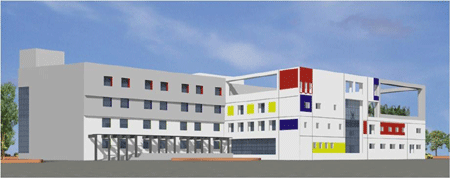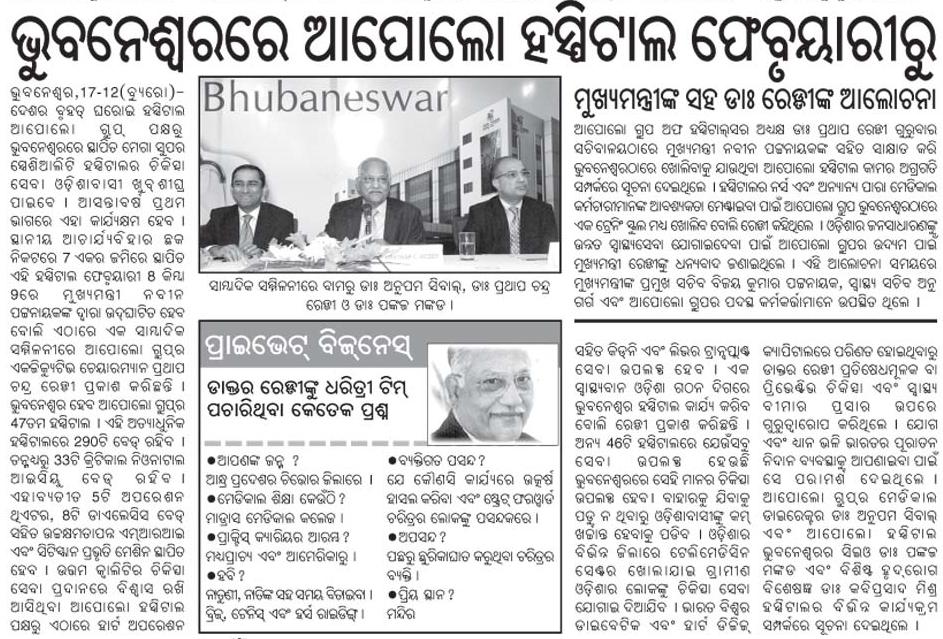The article at http://www.expresshealthcare.in/201005/market01.shtml by Rita Dutta gives a detailed exposition of the recent boom of healthcare facilities in Bhubaneswar. A few years back a WIPRO VP mentioned the lack of such facilities as one of the main reasons (others being availability of high class housing, high class schools, and good shopping opportunities) why many top IT managers were unwilling to move to Bhubaneswar to manage bigger teams. Fortunately there has been movement in all these fronts.
Following are some excerpts from the abovementioned article.
However, recent industrial, infrastructural and educational development in Bhubaneswar, has made the city, considered to be one of the cleanest and planned cities of modern India and one of the fastest developing cities of India, the epicentre of healthcare revolution in Orissa. Says Bipul K Jha, Industry Analyst, Healthcare Practice, South Asia & Middle East, Frost and Sullivan, "This change has been powered by the huge investment flow, rising employment opportunities, and increasing foothold of service-based sectors, which has in turn led to rise in purchasing power and increased standards of living."
Bhubaneswar, now being dubbed ‘the rising star of the East’, has attracted a whopping Rs 6,00,000 crore investment from across all industries like IT, technology, steel, aluminium, tourism, health and education sectors. Huge capex by the large industrial houses in the core infrastructure sector has witnessed a rise of 11.5 per cent in the last two years. The per capita income of the state has shot up from Rs 10,567 in 1999-2000 to Rs 16,149 in 2007-08. The population has grown by nearly 8 per cent in the last decade; the metro area of Bhubaneswar has mixed culture population base of 19 lakh, housing almost 11 percent of the urban population of the state. "Moreover, one corporate hospital (Kalinga Hospital) has set an example for other players by being an early market entrant and doing good business," says Jha.
It is a highly under-served market with its ratio of beds per 1,000 population being two-thirds of the national average of 0.86. What is attracting corporates like Apollo, AMRI, Narayana Hrudayalaya, Vedanta Aluminium, Asian Heart and Global to set up base here is the untapped potential. Says Dr K Ravindranath, Chairman, Global Hospital, who is setting up a 200-bed hospital in Bhubaneswar, "Our hospitals in Chennai and Hyderabad have always been getting a steady stream of patients from Eastern India, which constitutes one third of India’s population. Eastern India is also frequented by patients from Nepal and Bangladesh. So it makes complete business sense to foray into Bhubaneswar, before anyone else does."
Explains Dr Ramakant Panda, Vice Chairman, Asian Heart Institute, Mumbai as why he has planned a hospital in Bhubaneswar. "There is a dire need for hospitals with good infrastructure in Bhubaneswar. Moreover, being from Orissa, I want to do my bit for the State."
Adds Harihar Rath, Deputy General Manager, Marketing, Apollo Hospital, Bhubaneswar, "Lacunae of healthcare services and the rising disposable income of people of the regions are the main reasons for healthcare investment in the area. With more IT and BPO firms setting up offices in Bhubaneswar, the paying populace has also increased."
Government Impetus
The present Chief Minister, Naveen Patnaik, has played a crucial role in giving the much-required thrust, according to Dr Bidhan Das, Managing Director, Octavo Solutions, a consultancy firm that has done some projects in Orissa. "The Government’s efforts to improve infrastructure in the city have induced private realtors like DLF to invest. The entry of retail chains like Reliance, Big Bazaar, and Pantaloons has helped the Government to support the economy of Bhubaneswar. The uplift of the economy has attracted corporates to invest in healthcare," says he.
…
The Impact
From a city that lagged behind in diagnostic procedures, today hospitals in the city have radiology procedures like 64 slice CT, 1.5 Tesla MRI, 3-D ultrasound and digital mammogram. The cath labs are flat panel, while OTs have laminar air flow and HEPA filters. All 50 speciality and super speciality treatments are available now in the leading hospitals. The city’s first corporate hospital, Kalinga Hospital, now offers kidney transplantation, LV Prasad Eye Institute has taken the lead in dealing with complicated ophthalmic cases, while high risk cardiac cases are dealt with by Kalinga Hospital, Aditya Care and Apollo Hospital. With Hemalata Cancer Hospital now providing all three branches of oncology treatment, especially linear accelerator with IMRT and CT stimulation, the high cancer burden of the state has been taken care of.
In the current scenario, while existing hospitals are introducing cutting edge technology, scaling up and even planning larger hospitals, corporates are rushing in to grab a pie of the market. Diagnostic giants like Dr Lalpathlabs, Ranbaxy and Piramal Diagnostics have set-ups there. Even stem cell banking, a relatively new concept, is picking up here. Cryobanks International India, which deals in umbilical cord blood stem cell banking, has opened a collection centre in Bhubaneswar. As many as three private medical colleges (Hi-Tech Medical College, Sum Medical College and Kalinga Institute of Medical Sciences) have come up in Bhubaneswar in the last few years. Even a slew of nursing colleges have also been set up to fulfil the skyrocketing demand. The healthcare boom has paved the path for many NRI doctors (both Oriya and non Oriya) to show willingness to work in Bhubaneswar, a trend that is a recent phenomenon.
Here’s a look at the players who powered the change.
Kalinga Hospital: It would be no exaggeration to say that it was Kalinga Hospital that took the first initiative to change the healthcare firmament of the state. The hospital was conceived and promoted by 62 non resident Oriyas, who are mostly doctors by profession, based in the US and the UK. With an aim to provide the latest medical technology to the people of the state and to stop them from going outside the state seeking treatment, the doctors pumped in Rs 30 crore to start Kalinga Hospital located at Chandrasekharpur area of Bhubaneswar, with 160 beds in 1998.
Today, the 250-bed Kalinga Hospital spread over 10 acres is the first hospital in Orissa to do regular cardiac cath, open heart surgery, dialysis and kidney transplant, advanced neuro surgery, gastro-intestinal surgery and cosmetic surgery. It is the only recognised centre in the State for kidney transplantation. …
LV Prasad Eye Institute: This hospital, set up in July 2006, has taken the city’s ophthalmology care several notches higher. This not-for-profit institute, that conducts 35 per cent of all care at no cost to the patients, has a unique ocular prosthesis laboratory that offers cosmetic eyes tailored to the patients’ needs. The institute started the state’s first community eye bank for corneal retrieval and transplantation. Named ‘Drusti Daan’, the eye bank is housed on campus, but serves all of Orissa. Several surgeries that it has pioneered in Orissa are Infiniti cataract surgical system, constellation vitrectomy system and radio frequency devices offering bloodless eye plastic and orbit surgery. …
Aditya Care Hospital: Hyderabad’s Care Hospital started this 100-bed cardiology hospital on a leased property near Municipal Kalyan Mandap at Chandrasekharpur in September 2007. The list of procedures that the hospital has pioneered in Orissa include EP study and RFA, Paediatric Cardiology Intervention and CRT. Besides, the hospital has taken a lead in doing PTCA with stenting and ICD in cardiology, CABG multiple grafts and paediatric cardiac surgery like VSD closure, ASD closure and PDA in cardiac surgery, haemodialysis, laparoscopic surgery and joint replacement surgery.
"The hospital will be scaled up to 300 beds, for which 3.92 acres of land has been obtained from the Government of Orissa," adds Dr Mishra.
Hemalata Hospitals and Research Centre: This super speciality hospital focusing on oncology is the state’s only comprehensive cancer hospital in the private sector that offers medical oncology, radiation therapy and cancer surgery under one roof. This 100- bed unit, with a built up area of 80,000 square metres, was set up in 2005. The project was conceived by Dr Arabinda Rath and funded by TDB. This is the only hospital in Orissa with a linear accelerator….
Apollo Hospital: In March this year, Apollo Hospital inaugurated the city’s largest tertiary care hospital in Bhubaneswar with 150 beds, expandable to 350 beds. This Rs-150-crore project is spread over two lakh square feet in a sprawling campus of 7.5 acres, providing over 50 specialities. The hospital has installed the State’s first 64 slice CT and paediatric cardiology unit. It also has a telemedicine facility. …
In the Pipeline
There are many more hospitals in the pipeline.
AMRI Hospitals: A joint venture between Emami and Shrachi Group of Industries, Kolkata-based AMRI Hospitals is coming out with a multi-speciality hospital at Khandagiri Square, a prime location in Bhubaneswar. This is AMRI’s first project outside Kolkata.
Says DN Agarwal, Executive Director, AMRI Hospitals, "This Rs-120-crore project with 300 beds spread over five acres would have an FSI of 3,50,000 square feet. This is likely to be commissioned by August 2010."
Sparsh Hospital: Sparsh Hospital, which runs an 80-bed hospital and claims to have pioneered procedures like Chemoport insertion and Hicman’s catheterisation in Bhubaneswar, has planned a 250-bed set up in the Chandrasekharpur area of the city. The new project, built at a cost of Rs 40 crore, would house all super speciality facilities under one roof. Says Dr Ghanashyam Biswas, Director, Sparsh Hospital, "The construction for the new project will start by 2011 and will be completed by 2013."
Care Hospital: After achieving success with the JV project Aditya Care, the Care group has planned a multi super speciality hospital of 200 beds in Chandrasekharpur. The 4.5 acres were acquired around 18 months back, but due to trespassing, construction has not begun yet.
Ayush Hospital: This group, which runs a 120-bed hospital at Acharya Vihar Square in Bhubaneswar, has drawn up a plan for its second multi-speciality hospital in the city at an investment of about Rs 200 crore. The proposed hospital would be equipped with over 500 beds and it is expected to be operational by 2012. Says Dr Ashok Acharya, MD, Ayush Hospital, "The land is being identified for the project and construction work for this hospital is expected to start from next year."
Global Hospital: Hyderabad-based Global Hospital is building a 200-bed hospital. This project, built at an estimated cost of Rs 100 crore on a leased building, would be focusing on tertiary and quaternary care (specially renal transplants). Says Dr K Ravindranath, Chairman, Global Hospital, "This is a JV project with a local group, whose founders are my patients. This is their first venture in healthcare. The hospital would be known as Global Hospital." He added that the cost of equipping the hospital would be borne by Global Hospital. Construction is expected to start by November this year and commissioning is likely by the end of next year.
Narayana Hrudayalaya: Bengaluru-based Narayana Hrudayalaya is coming up with a 750-bed health city at Dum Duma at Khandagiri Square. The hospital, spread over seven acres, would provide multi super speciality treatment. Says Dr Ashutosh Raghuvanshi, Vice Chairman, Narayana Hrudayalaya, "The first phase of the hospital with 250 beds is being built at a cost of Rs 80 crore. We would start construction of the hospital after the monsoons, this year. We would commission the first phase by 2012."
Desun Hospital: Kolkata-based Desun Hospital and Heart Institutive has planned a hospital on Bhubaneswar Cuttack Road. The 250-bed green field project is slated to be commissioned by 2013. Says Sajal Dutta, CMD, Desan Hospital, "This multi super speciality hospital is being set up at an estimated cost of Rs 80 crore."
Vedanta Aluminium: Fulfilling the need for a full-fledged trauma centre, Vedanta Aluminium is setting up a 100-bed state-of-the-art trauma care centre near Gangapada on National Highway 5. This Rs-75-crore project is coming up on 10 acres of land.
Asian Heart Institute: Mumbai’s Asian Heart Institute (AHI), established by Dr Ramakant Panda and a few other cardiologists, has also announced plans of opening a state-of-the-art multi speciality hospital in Chandrasekharpur. Spread over 1,50,000 square feet, the 400-bed hospital is expected to come up with an investment of Rs 150 crore. Says Dr Ramakant Panda, Vice Chairman, AHI, "We have a start-up plan for 200 beds at an estimated cost of Rs 70 crore. We would eventually expand it to 400 beds, spending Rs 150 crore." About the significance of the project, he says, "AHI has set a benchmark in providing quality care in the country. Our project in Orissa would be built on the same principles as AHI, Mumbai and would offer the patients the same treatment and care at world class standards."
It will have 12 ultra modern operation theatres, 100 intensive care units, fully equipped modernised pathology services, radiology, imaging services, blood bank, 24-hour pharmacy services and cardiac ambulance services with mobile cathlab. Though the foundation stone of the hospital has been laid, progress was stalled by some dispute regarding the land. "As the land being sought for the project is a Government land, hence acquiring it is a little issue," says Dr Panda.
UIMS: A group of non-resident Oriyas have joined hands to set up Orissa’s first nuclear medicine centre- Utkal Institute of Medical Sciences (UIMS).
AIIMS: The upcoming All India Institute of Medical Sciences (AIIMS) at Bhubaneswar will have a 978-bed hospital. Besides, 15 super speciality and 18 speciality wards have also been proposed. The State Government is supposed to provide 100 acres of land free at Sijua on the outskirts for the prestigious institute. According to a review meeting, while 93 acres have already been transferred for construction, the rest will soon be handed over. The State Government had already provided road connectivity. The much-hyped project is scheduled for completion by 2012.
…
The Road Ahead
As more hospitals are being set up, more state-of-the-art technology will be introduced and more choices will be offered to patients. To address the dearth of paramedic and nursing staff, hospitals are keen on starting paramedical and nursing colleges. During inauguration of Apollo Hospital, Bhubaneswar, Dr Prathap Reddy, Chairman, Apollo Hospital Group, pleaded to the Government regarding land for a medical and paramedical college. Kalinga Hospital, which started GNM nursing school in 2004, is scaling up its intake from 50 to 100 students a year. Some are optimistic that the city would become a Mecca for medical tourism for countries like Bangladesh and Nepal. With big moolah pouring in, a steady infrastructure and active support from the Government, it can only be sunshine!
rita.dutta@expressindia.com
